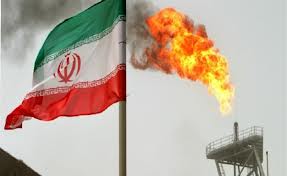 HONG KONG/TOKYO, April 11 (Reuters) -�South Korea�could become the second major buyer of Iran's crude to face a halt in imports from the Middle Eastern nation, as insurers broaden Western sanctions to refineries, people involved with the matter say.
HONG KONG/TOKYO, April 11 (Reuters) -�South Korea�could become the second major buyer of Iran's crude to face a halt in imports from the Middle Eastern nation, as insurers broaden Western sanctions to refineries, people involved with the matter say.Tough curbs by the United States and Europe to force Tehran to end its nuclear programme have more than halved Iran's oil exports over the past year, as an EU ban on insurers aiding transport of its crude left buyers unable to find coverage.
Now the focus is shifting to refineries that process the oil, as insurers worry about running afoul of the sanctions.
Refiners operating without insurance pose huge financial risks to their owners. Indian insurers have already taken a tough stance, warning that they would not be able to pay claims at plants processing Iranian crude.
A similar move is underway in�South Korea, the fourth-biggest buyer of Iranian crude, worth about half a billion dollars each month.
Hyundai Oilbank, one of South Korea's two refiners of Iranian crude, struggled to find reinsurers willing to renew its coverage late last year, a person with direct knowledge of the matter said.
"It's not a problem of a higher price. Even if the reinsurers get a higher premium for covering Iranian crude, the policy is forbidden," the person said, adding that the world's two biggest reinsurers, Munich Re and Swiss Re, did not want to cover Iranian crude for fear of breaching the sanctions.
The person is an employee of reinsurer Korean Re, and did not want to be identified.
Reinsurers back insurance companies, and without the former, the insurance industry can't function. Wariness by reinsurers in both Europe and the United States, who dominate the global market, was among the chief reasons why India's insurers have said they may not be able to provide coverage.
Refiners in India, which is Iran's second-biggest crude buyer, said last month that they would halt imports if they were unable to find a solution.
SK ENERGY CONTRACTS DUE IN JULY
Insurance contracts for South Korea's other major Iranian crude oil refiner, SK Energy, come due in July, said the Korean Re employee.
Most Iranian crude flows to Asia, with�China, India,�Japan�and South Korea the biggest buyers. It was not immediately clear how China's insurers and reinsurers are treating the sanctions in relation to refiners.
Responding to a Reuters query about what�China�would do if global reinsurers stopped covering refineries processing Iranian crude, Foreign Ministry spokesman Hong Lei said China's economic development required it to keep normal energy ties with�Iran.
"This cooperation is transparent," Hong said. "Such cooperation is also not in violation of the relevant resolutions of the United Nation's Security Council and does not hurt the interests of the international community."
State-backed reinsurer�China�Re was not immediately available for comment.
Last year, when sanctions wiped out tanker insurance, it forced a temporary halt to imports in�Japan�and South Korea. To get around the ban, South Korea and China asked Iranian tankers covered by Iranian insurance to deliver the oil. India provided partial insurance and allowed Iran to deliver, and Japan provided a sovereign guarantee.
The countries were still paying nearly $3.5 billion to Iran each month for oil at the time.
A decision by global reinsurers to stop covering refineries processing Iranian crude could wipe out that remaining trade.
REINSURERS' DECISION
Iran's remaining oil exports depend in large part on the $50 billion global�reinsurance�industry, which underlies all insurance policies, including those of oil refineries.
Domestic insurers typically write policies but they rely on the financial support of a handful of global reinsurers, particularly for large policies such as those for refineries.
Eight of the ten largest reinsurers in the world are based in the European Union or the United States, according to insurance ratings agency A.M. Best.
Those reinsurers, especially those in Europe, are becoming increasingly concerned about EU sanctions that expressly prohibit "directly or indirectly...insurance and re-insurance related to the import, purchase or transport of crude oil and petroleum products of Iranian origin."
In an e-mail reply to Reuters' questions, the world's largest reinsurer, Munich Re, said Iranian crude was deemed such until it had been subjected to "material, economically justified processing in a third country", and it was necessary for insurers to check if it was being processed to bypass sanctions.
"In many cases [these checks] will certainly prompt insurers to refuse cover due to apprehension about breaching the sanctions," Munich Re said.
Munich Re declined to comment on Hyundai Oilbank and did not directly address whether it would cover refineries processing Iranian crude.
Swiss Re, the world's second-largest reinsurer, declined comment.
Insurance contracts for refineries typically come up for renewal each year. Korean Re has begun asking multinational insurers to clarify how they will treat Iranian crude in refineries, the employee said.
Roughly half of the reinsurers Korean Re speaks to will cover Iranian crude in refineries; the rest refuse, citing sanctions, the Korean Re employee said.
"It's a gray area. It is really ambiguous."
TOUGH TO ENFORCE
Whether refineries fall under the sanctions may be a moot point as the rules will be difficult to enforce, said a Japanese insurance executive, who recently negotiated refinery policies with European reinsurers ahead of April 1 renewals.
Refineries process crude from many countries and aren't required to disclose the origin of the crude they process, said the source, who spoke on condition of anonymity.
Furthermore, once Iranian oil is imported, its ownership transfers to the refinery, the source added.
By Reuters
The Iran Project is not responsible for the content of quoted articles.










